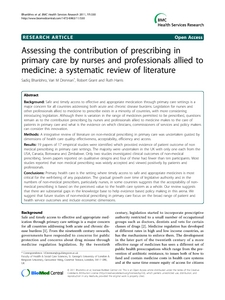Bhanbhro, S; Drennan, VM; Grant, R; Harris, R
(2011)
Assessing the contribution of prescribing in primary care by nurses and professionals allied to medicine: a systematic review of literature.
BMC Health Services Research, 11 (330).
ISSN 1472-6963
https://doi.org/10.1186/1472-6963-11-330
SGUL Authors: Drennan, Vari MacDougal
![[img]](https://openaccess.sgul.ac.uk/661/1.hassmallThumbnailVersion/1472-6963-11-330.pdf)  Preview |
|
["document_typename_application/pdf; charset=binary" not defined]
Published Version
Download (268kB)
| Preview
|
Abstract
BACKGROUND: Safe and timely access to effective and appropriate medication through primary care settings is a major concern for all countries addressing both acute and chronic disease burdens. Legislation for nurses and other professionals allied to medicine to prescribe exists in a minority of countries, with more considering introducing legislation. Although there is variation in the range of medicines permitted to be prescribed, questions remain as to the contribution prescribing by nurses and professionals allied to medicine makes to the care of patients in primary care and what is the evidence on which clinicians, commissioners of services and policy makers can consider this innovation.
METHODS: A integrative review of literature on non-medical prescribing in primary care was undertaken guided by dimensions of health care quality: effectiveness, acceptability, efficiency and access. RESULTS: 19 papers of 17 empirical studies were identified which provided evidence of patient outcome of non medical prescribing in primary care settings. The majority were undertaken in the UK with only one each from the USA, Canada, Botswana and Zimbabwe. Only two studies investigated clinical outcomes of non-medical prescribing. Seven papers reported on qualitative designs and four of these had fewer than ten participants. Most studies reported that non medical prescribing was widely accepted and viewed positively by patients and professionals.
CONCLUSIONS: Primary health care is the setting where timely access to safe and appropriate medicines is most critical for the well-being of any population. The gradual growth over time of legislative authority and in the numbers of non-medical prescribers, particularly nurses, in some countries suggests that the acceptability of non-medical prescribing is based on the perceived value to the health care system as a whole. Our review suggests that there are substantial gaps in the knowledge base to help evidence based policy making in this arena. We suggest that future studies of non-medical prescribing in primary care focus on the broad range of patient and health service outcomes and include economic dimensions.
| Item Type: |
Article
|
| Additional Information: |
© 2011 Bhanbhro et al; licensee BioMed Central Ltd. This is an Open Access article distributed under the terms of the Creative Commons Attribution License (http://creativecommons.org/licenses/by/2.0), which permits unrestricted use, distribution, and reproduction in any medium, provided the original work is properly cited. |
| Keywords: |
Botswana, Canada, Drug Prescriptions, Great Britain, Humans, Nurse's Practice Patterns, Pharmacists, Primary Health Care, United States, Zimbabwe, Science & Technology, Life Sciences & Biomedicine, Health Care Sciences & Services, NATIONAL QUESTIONNAIRE SURVEY, SUPPLEMENTARY, HEALTH, UK, PHARMACISTS, EXPERIENCES, ADULT, VIEWS |
| Journal or Publication Title: |
BMC Health Services Research |
| ISSN: |
1472-6963 |
| Related URLs: |
|
| Dates: |
| Date | Event |
|---|
| 2 December 2011 | Published |
|
| Web of Science ID: |
WOS:000298648600001 |
  |
Download EPMC Full text (PDF)
|
 |
Download EPMC Full text (HTML)
|
| URI: |
https://openaccess.sgul.ac.uk/id/eprint/661 |
| Publisher's version: |
https://doi.org/10.1186/1472-6963-11-330 |
Statistics
Item downloaded times since 30 Apr 2012.
Actions (login required)
 |
Edit Item |



